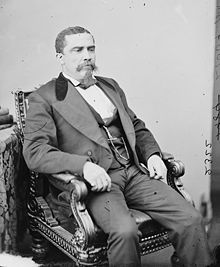BLACK SOCIAL HISTORY
Alonzo J. Ransier
| BLACK SOCIAL HISTORY |
| Alonzo Jacob Ransier | |
|---|---|
 | |
| Member of the U.S. House of Representatives from South Carolina's 2nd district | |
| In office March 4, 1873 - March 3, 1875 | |
| Preceded by | Robert C. De Large |
| Succeeded by | Edmund W.M. Mackey |
| 56th Lieutenant Governor of South Carolina | |
| In office December 3, 1870 - December 7, 1872 | |
| Governor | Robert Kingston Scott |
| Preceded by | Lemuel Boozer |
| Succeeded by | Richard Howell Gleaves |
| Member of the South Carolina House of Representatives from Charleston County | |
| In office November 24, 1868 - March 1, 1870 | |
| Personal details | |
| Born | January 3, 1838 Charleston, South Carolina |
| Died | August 17, 1882 (aged 48) Charleston, South Carolina |
| Political party | Republican |
| Profession | clerk, politician, tax collector |
Alonzo Jacob Ransier (January 3, 1834–August 17, 1882) was an African-American politician in South Carolina. He was the state's first black Lieutenant Governor and later was a Republican United States Congressman from 1873 until 1875.
Born free in Charleston, South Carolina, Ransier was the son of parents who were light-skinned free people of color, with visible European ancestry. He worked as a shipping clerk until he was appointed after the Civil War as state registrar of elections in 1865.
He was elected in 1868 to the South Carolina House of Representatives serving to 1869, and also was a member of the state constitutional convention in 1868. It authorized a public school system for the first time, as well as charitable institutions.
In 1870 Ransier was elected the 54th Lieutenant Governor of South Carolina. He was elected to the Forty-third United States Congress from South Carolina's 2nd Congressional District.
In Congress he fought for the Civil Rights Bill of 1875. He also backed high tariffs and opposed a federal salary increase. He campaigned for President Ulysses S. Grant and advocated a six-year presidential term.
After leaving Congress in 1875, Ransier was appointed by Republicans as a collector for the Internal Revenue Service.


















































No comments:
Post a Comment